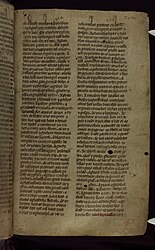Breudwyt Ronabwy ‘The dream of Rhonabwy’
- Middle Welsh
- prose
- Mabinogion
- Madawc uab Maredud a oed idaw Powys yn y theruyneu
- Middle Welsh
Sources
Primary sources Text editions and/or modern translations – in whole or in part – along with publications containing additions and corrections, if known. Diplomatic editions, facsimiles and digital image reproductions of the manuscripts are not always listed here but may be found in entries for the relevant manuscripts. For historical purposes, early editions, transcriptions and translations are not excluded, even if their reliability does not meet modern standards.
Secondary sources (select)
This study examines dreams found in medieval Welsh literature from c. 1100 to c. 1550. The scope of the research covers secular and religious prose and poetry of the period. The purpose of this study is to provide an insight into dream literature in medieval Welsh by analysing the various functions of dreams in different types of texts in relation to the narratives and genres. Chapter 1 lays out the conceptual and methodological framework necessary for analyses in the subsequent chapters, and maps out the European context of medieval Welsh dream literature. Chapters 2 examines dreams in medieval Welsh prose, including the two ‘breuddwyd’ texts of the Mabinogion and three texts belonging to the genre of areithiau pros. Chapter 3 examines dreams in medieval Welsh secular poetry. Chapter 4 examines dreams in medieval Welsh religious writings, including hagiographies and anti-hagiographies, apocalyptic and mystic visions. Finally, a conclusion summarises the roles that dreams play in different textual contexts within the field of medieval Welsh literature, and in which I argue that ‘breuddwyd’ does not constitue a specific genre; instead, working within the various contexts and genres in which Welsh texts containing dreams are situated, the dreams play an essential and dynamic part in the formation of the plot, world-building, liminality, as well as have the capacity for revealing many interesting features of the text.
Although the mid-twelfth-century figure Iorwerth Goch seems an obscure lurker in footnotes in works which consider medieval England or medieval Wales, the pattern of contemporary evidence about him is extraordinary. He appears as a subsidiary character in both the Welsh tale Breudwyt Ronabwy and the Anglo-French romance Fouke le Fitz Waryn. Extensive further evidence about him appears in the English government's Pipe Rolls and in Welsh chronicles, genealogies, and poetry. Iorwerth founded a hereditary March family which held manors for several generations in return for service as Anglo-Welsh interpreters and intermediaries. Memories of his exploits persisted in Wales and the Marches through the remainder of the middle ages. He is, thus, a good example of the bi-culturally adept lords in the Welsh Marches whose members could preserve and transmit oral traditions which lie behind the Breudwyt Ronabwy, Fouke le Fitz Waryn, and other similar tales.
External links
page url: https://codecs.vanhamel.nl/Breudwyt_Ronabwy
redirect: https://codecs.vanhamel.nl/Special:Redirect/page/339
numerical alternative: https://codecs.vanhamel.nl/index.php?curid=339
page ID: 339
page ID tracker: https://codecs.vanhamel.nl/index.php?title=Show:ID&id=339




